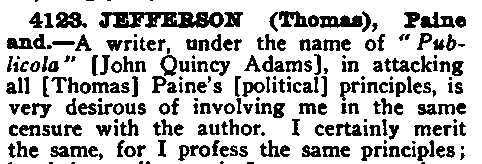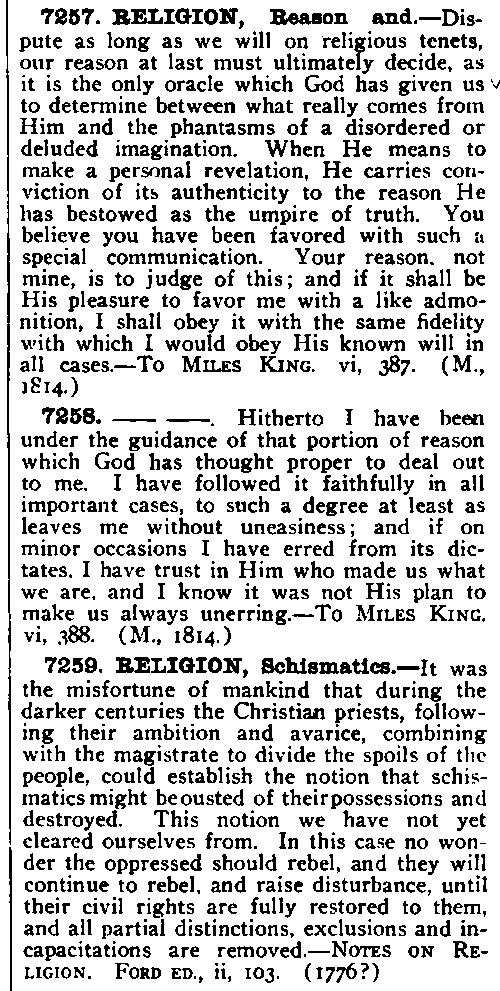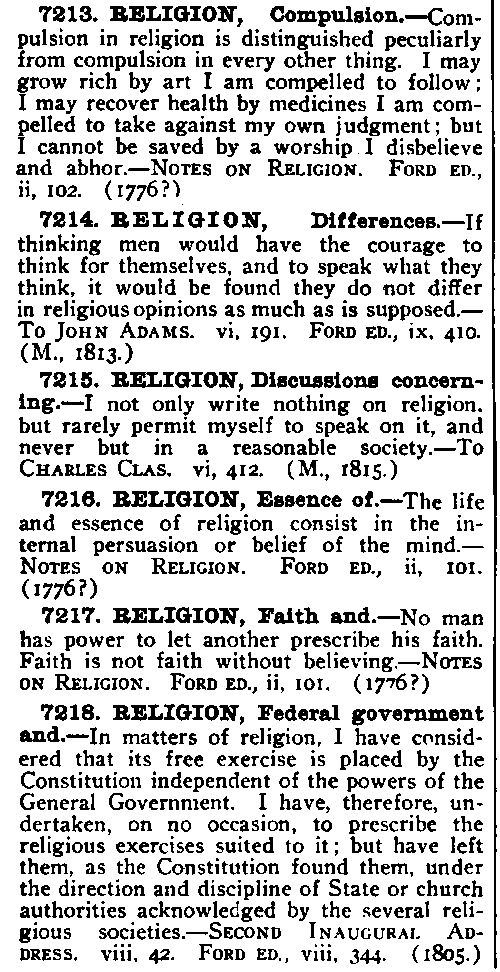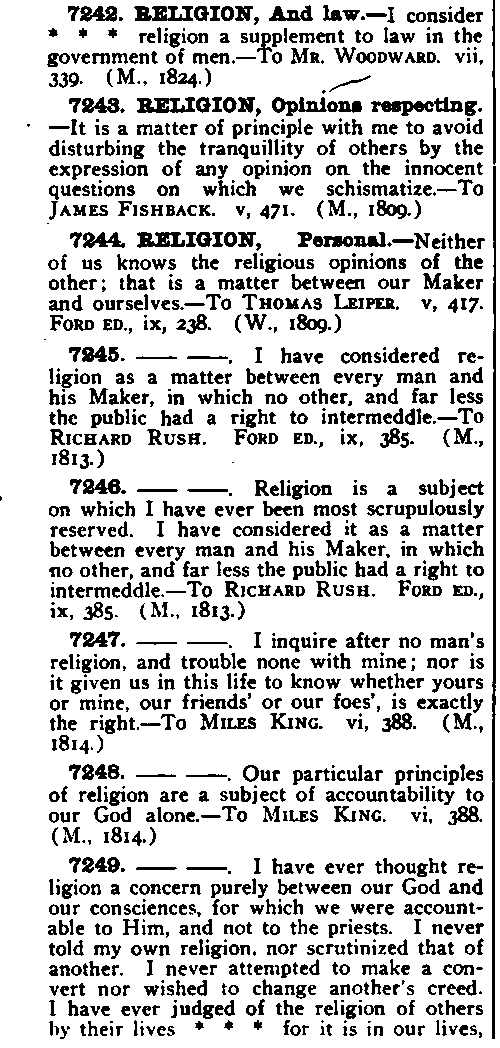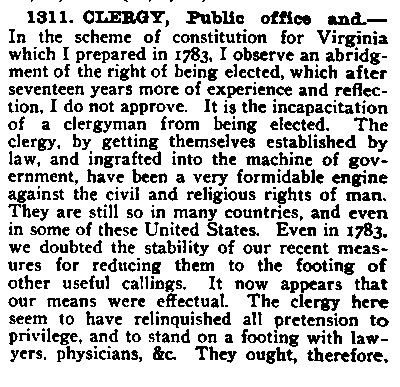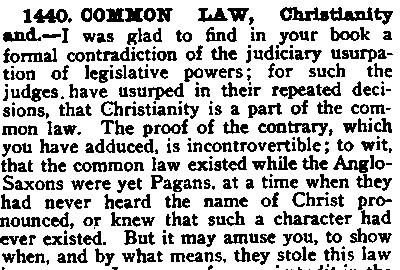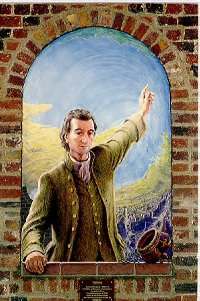See Dissecting Deism Past and Present
Thomas Jefferson: Deist or Christian? Debunking Dr James Kennedy
It's interesting that in these absurd culture wars the truth is ignored. On the side of the Religious Right Dr. Kennedy will try to define Jefferson/others as like himself, believing that gives him legitimacy. Same for the radical atheist/socialist left.
The fact is both have a political agenda. As a traditional Deist, I'm at odds with both of these groups and so would Thomas Jefferson if alive today. Their only real goal is to see who gets the gun they will point at everyone else's head.
The Net is full of websites full of quotes from experts nobody can find or books one can't locate. But every time I did check the facts out, both sides were proven liars. Google has put whole books online in their original form as pdf files. I like using texts that predate the 1920s for many subjects like this because they hadn't been poisoned by the culture wars and recent political agendas.
The book A Comprehensive Collection of the Views of Thomas Jefferson can be downloaded from Google. (It's a 51 meg pdf file.) Published in 1900, it blows the Kennedy fundies and the radical atheists out of the water.
What I did was save the sections as picture files and I will display here in original form. Thus one can see clearly Jefferson's style and words as he used them. They will be posted here above the passage, and my comments will be in bold red. For example, Jefferson rarely ever used the term God, but instead used the word "Deity." (I prefer Creator.) Jefferson, as many traditional deists did, believed in Divine Providence or simply Providence, the belief God is active in the universe and in human affairs. (But not controlling!) This is not the Christian definition of "God went away" of the 19th century Christian propagandists or the radical French Enlightenment so loved by radical atheists/leftists.
Jefferson believed in an afterlife. Jefferson never called himself a Deist, but a Unitarian. In America and England of that time the two were much the same, a branch within liberal Protestantism. Unitarians rejected the Trinity, Original Sin, etc. and other Gnostic beliefs.
Kennedy states Jefferson would be a nightmare to the ACLU; he would also be a nightmare to Kennedy. So I present the real "pictures" below and at the end, Jefferson's views of Jesus. To quote Jefferson, "I am a Christian, in the only sense he wished any one to be; sincerely attached to his doctrines, in preference to all others; ascribing to himself every human excellence; and believing he never claimed any other."
Thomas Jefferson: Deist or Christian?
June 19, 2002 by Dr. James Kennedy, posted the following at Worldnet Daily.
Dr. Kennedy: "Thomas Jefferson, as we all know, was a skeptic, a man so hostile to Christianity that he scissored from his Bible all references to miracles. He was, as the Freedom From Religion Foundation tells us, "a Deist, opposed to orthodox Christianity and the supernatural." Or was he? While Jefferson has been lionized by those who seek to drive religion from public life, the true Thomas Jefferson is anything but their friend. He was anything but irreligious, anything but an enemy to Christian faith. Our nation's third president was, in fact, a student of Scripture who attended church regularly, and was an active member of the Anglican Church, where he served on his local vestry. He was married in church, sent his children and a nephew to a Christian school, and gave his money to support many different congregations and Christian causes.
Me: I also give money to help a local Methodist Church with their youth program. I even attend the church on occasion and the pastor knows I'm a Deist, it's on the license plate of my car. But what did Jefferson say about all of this? He believed in God, science, theistic evolution, and thought Christian dogma fostered atheism. I was also married in a church.
----- Jefferson to Dr. Benjamin Waterhouse, June 26, 1822
Dear Sir,- I have received and read with thankfulness and pleasure your denunciation of the abuses of tobacco and wine. Yet, however sound in its principles, I expect it will be but a sermon to the wind. You will find it as difficult to inculcate these sanative precepts on the sensualities of the present day, as to convince an Athanasian that there is but one God. I wish success to both attempts, and am happy to learn from you that the latter, at least, is making progress, and the more rapidly in proportion as our Platonizing Christians make more stir and noise about it. The doctrines of Jesus are simple, and tend all to the happiness of man.
1. That there is one only God, and he all perfect.
2. That there is a future state of rewards and punishments.
3. That to love God with all thy heart and thy neighbor as thyself, is the sum of religion.
These are the great points on which he endeavored to reform the religion of the Jews. But compare with these the demoralizing dogmas of Calvin.
1. That there are three Gods.
2. That good works, or the love of our neighbor, are nothing.
3 That faith is every thing, and the more incomprehensible the proposition, the more merit in its faith.
4. That reason in religion is of unlawful use.
5. That God, from the beginning, elected certain individuals to be saved, and certain others to be damned; and that no crimes of the former can damn them; no virtues of the latter save.
Now, which of these is the true and charitable Christian? He who believes and acts on the simple doctrines of Jesus? Or the impious dogmatists, as Athanasius and Calvin?...doctrine of one only God is reviving, and I trust that there is not a young man now living in the United States who will not die an Unitarian...

- Jefferson Deity 1 (Displayed above)
- Jefferson Deity part 2
- Jefferson Deity part 3
Me: But if it looks like bad news for Kennedy, it's also bad news for atheism/socialism in parts 2 and 3. I should further note that Jefferson believed God to be good and rejected this raving and tyrannical view of God in the Old Testament and Calvinist dogma. That to quote (part 2), "May the Infinite Power which rules the destinies...give them...peace and prosperity." 1st Inaugural Address 1801 in public. Hardly a suggestion of public suppression of God.
Dr. Kennedy: "Moreover, his "Notes on Religion," nine documents Jefferson wrote in 1776, are "very orthodox statements about the inspiration of Scripture and Jesus as the Christ," according to Mark Beliles, a Providence Foundation scholar and author of an enlightening essay on Jefferson's religious life."
Me: The foundation of Christianity is Gnostic revelation, which Jefferson clearly rejects. Like Paine (and myself) he holds revelation as a possibility, but it must be judged by reason. Thus reason over rules revelation. Thus the Old Testament as written, produces no proof about the claims made of Jesus as some Gnostic savior deity dying for our sins. Christians take an allegorical view of the Old Testament, then claim "guidance" of a Holy Spirit. What does Jefferson say about Thomas Paine and revelation?
Dr. Kennedy: So what about the Jefferson Bible, that miracles-free version of the Scriptures? That, too, is a myth. It is not a Bible, but an abridgement of the Gospels created by Jefferson in 1804 for the benefit of the Indians. Jefferson's "Philosophy of Jesus of Nazareth Extracted From the New Testament for the Use of the Indians" was a tool to evangelize and educate American Indians. There is no evidence that it was an expression of his skepticism.
Jefferson, who gave his money to assist missionary work among the Indians, believed his "abridgement of the New Testament for the use of the Indians" would help civilize and educate America's aboriginal inhabitants. Nor did Jefferson cut all miracles from his work, as Beliles points out. While the original manuscript no longer exists, the Table of Texts that survives includes several accounts of Christ's healings.
Me: How totally absurd. Jefferson says no such thing as "Philosophy of Jesus of Nazareth Extracted From the New Testament for the Use of the Indians." The actual title is The Life and Morals of Jesus of Nazareth Extracted Textually from the Gospels. He does not use the word "Christ," then he left out one of the central events of Christianity, the Resurrection? That this isn't the original? Finally, how many Christians would hand out this instead of the King James? Can I see that table of texts in the original Dr. Kennedy?
Dr. Kennedy: But didn't Jefferson believe in the complete separation of church and state? After all, Jefferson's 1802 letter to the Baptists in Danbury, Conn., in which he cited the First Amendment's creation of a "wall of separation" between church and state, is an ACLU proof-text for its claim that the First Amendment makes the public square a religion-free zone. But if the ACLU is right, why, just two days after he sent his letter to the Danbury Baptists did President Jefferson attend public worship services in the U.S. Capitol building, something he did throughout his two terms in office? And why did he authorize the use of the War Office and the Treasury building for church services in Washington, D.C.?
- Jefferson's Letter to the Danbury Baptists which concerned religious liberty, not separation of church/state.
Dr. Kennedy: Jefferson's outlook on religion and government is more fully revealed in another 1802 letter in which he wrote that he did not want his administration to be a "government without religion," but one that would "strengthen...religious freedom."
Me: Finally score one for Dr. Kennedy, or at least half right. Here is one that will drive the leftist ACLU and him crazy:
- Jefferson Religion 1
- Jefferson Religion 2
- Jefferson Religion 3
- Jefferson Religion 4
- Jefferson Religion 5 (above)
Dr. Kennedy: Jefferson was a true friend of the Christian faith. But was he a true Christian? A nominal Christian - as demonstrated by his lifelong practice of attending worship services, reading the Bible, and following the moral principles of Christ - Jefferson was not, in my opinion, a genuine Christian. In 1813, after his public career was over, Jefferson rejected the deity of Christ. Like so many millions of church members today, he was outwardly religious, but never experienced the new birth that Jesus told Nicodemus was necessary to enter the kingdom of Heaven.
Me: Now I understand, he was a member of the Religious Right before 1813 and supported their dogmatic agenda and rejection of religious freedom? Yet through his entire adult career he used deist' terms such as Deity, Providence, and Nature's God to refer to Jesus Christ the man-god? Did Jefferson really believe in the Gnostic Trinity god prior to 1813?
Dr. Kennedy: Nonetheless, Jefferson's presidential acts would, if done today, send the ACLU marching into court. He signed legislation that gave land to Indian missionaries, put chaplains on the government payroll, and provided for the punishment of irreverent soldiers. He also sent Congress an Indian treaty that set aside money for a priest's salary and for the construction of a church. Most intriguing is the manner in which Jefferson dated an official document. Instead of "in the year of our Lord," Jefferson used the phrase "in the year of our Lord Christ." Christian historian David Barton has the proof - the original document signed by Jefferson on the "eighteenth day of October in the year of our Lord Christ, 1804."
Me: Dr. Kennedy provides no dates, proof, or references. I don't operate by faith alone, let's see some verifiable proof.
The Supreme Court ruled in 1947 that Jefferson's wall of separation between church and state "must be kept high and impregnable. We could not approve the slightest breach." Judging from the record, it looks like the wall some say Tom built is, in fact, the wall Tom breached. The real Thomas Jefferson, it turns out, is the ACLU's worst nightmare.
Me: Here's some more to choke on Dr. Kennedy,
- Islam Versus Deism
- Left vs Right, Montesquieu, Corporatism
- Eastern Roman Empire and Islam
- Philosophies of Islam, Greece, and the West by Turgut Ozal
- Example of Islam and science.
- Maimonides Versus Aristotle and the Jews of Spain, Thirteen Rules
- Handbook on the History of Modern Science
- Pelagius and why he was right
- Islam Versus Judaism and Christianity
- Islam to Deism: Why I became a Deist
Web site Copyright Lewis Loflin, All rights reserved.
If using this material on another site, please provide a link back to my site.
